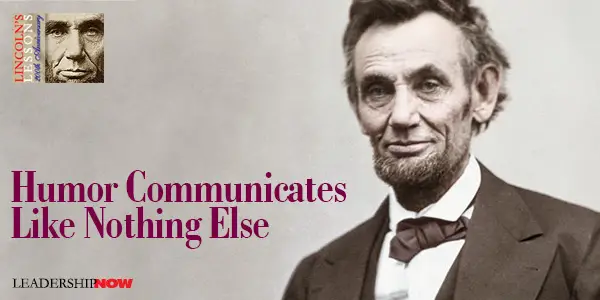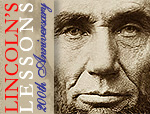 |
 |
02.12.09

Lincoln’s Lessons: Humor Communicates Like Nothing Else
 Though he carried a great burden, he used stories and jokes to persuade people and to break the tension. He enjoyed sharing an anecdote, a joke or a story with nearly everyone he came into contact with. Battle correspondent Henry Villard recalled that “None of his hearers enjoyed the wit—and wit was an unfailing ingredient—of his stories half as much as he did himself. It was a joy indeed to see the effect upon him….A high-pitched laughter lifted up his otherwise melancholy countenance with thorough merriment. His body shook all over, and when he felt particularly good over his performance, he followed his habit of drawing his knees, with his arms around them, up to his very face.” Lincoln used humor to communicate more effectively. He used it to make a point, to motivate or just to make people feel at ease. He knew people were more easily persuaded by a story or a joke than in almost any other way. He said, “I believe I have the popular reputation of being a storyteller, but I do not deserve the name in its general sense, for it is not the story itself, but its purpose, or effect, that interests me. I often avoid a long and useless discussion by others or a laborious explanation on my own part by a short story that illustrates my point of view. So, too, the sharpness of a refusal or the edge of a rebuke may be blunted by an appropriate story, so as to save wounded feeling and yet serve the purpose. No, I am simply a storyteller, but story-telling as an emollient saves me much friction and distress.” Treasury official Chauncey M. Depew recalled, "Several times when I saw him, he seemed to be oppressed not only with the labors of the position, but especially with care and anxiety growing out of the intense responsibility which he felt for the issue of the conflict and the lives which were lost. He knew the whole situation better than any man in the administration and virtually carried on in his own mind not only the civic side of the government but all the campaigns. And I knew when he threw himself (as he did once when I was there) on a lounge, and rattled off story after story, that it was his method of relief, without which he might have gone out of his mind, and certainly would not have been able to have accomplished anything like the amount of work which he did." Not everyone appreciated his many jokes or thought they were appropriate. But Lincoln used them to good effect. He once said, “I tell you the truth when I say that a funny story, if it has the element of genuine wit, has the same effect on me that I suppose a good square drink of whisky has on an old toper; it puts new life into me. The fact is I have always believed that a good laugh was good for both the mental and the physical digestion.” Probably more to the point, he remarked, “I laugh because I must not weep—that’s all, that’s all.” Of Related Interest:
Posted by Michael McKinney at 01:14 AM
|
BUILD YOUR KNOWLEDGE
 

How to Do Your Start-Up Right STRAIGHT TALK FOR START-UPS 
Grow Your Leadership Skills NEW AND UPCOMING LEADERSHIP BOOKS 
Leadership Minute BITE-SIZE CONCEPTS YOU CAN CHEW ON 
Classic Leadership Books BOOKS TO READ BEFORE YOU LEAD |